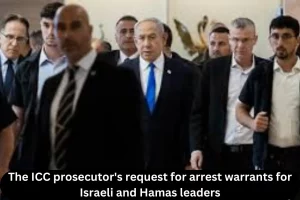ForumIAS announcing GS Foundation Program for UPSC CSE 2025-26 from 18th June. Click Here for more information.

Source: The post the ICC prosecutor’s request for arrest warrants for Israeli and Hamas leaders has been created, based on the article “Pratap Bhanu Mehta writes on ICC seeking arrest of Benjamin Netanyahu: Why we need humanity’s law” published in “Indian express” on 22nd May 2024.
UPSC Syllabus Topic: GS Paper 2-International Relations-Important International institutions, agencies and fora, their structure, mandate.
Context: The article discusses the International Criminal Court (ICC) prosecutor’s request for arrest warrants for Israeli and Hamas leaders. It highlights skepticism about the ICC, noting its selective enforcement and challenges in international law. The request raises stakes, potentially harming Israel’s reputation and creating global tension. The ICC prosecutor’s request for arrest warrants for Israeli and Hamas leaders
For detailed information on ICC read this article here
What is the ICC prosecutor‘s request?
Arrest Warrants Sought: The ICC prosecutor seeks arrest warrants for Israeli Prime Minister Benjamin Netanyahu, Defence Minister Yoav Gallant, and three Hamas leaders, including Yahya Sinwar.
Expert Support: This request is backed by five international law experts.
Humanitarian Violations: The prosecutor accuses Israel of deliberately starving civilians and both Israel and Hamas of violating armed conflict laws.
Why is skepticism present regarding the ICC?
Selective Attention: The ICC is accused of focusing selectively on certain cases.
Enforcement Issues: Many ICC rulings go unenforced, even by its member states.
Major Power Non-Signatories: Three of the five permanent members of the Security Council—China, Russia, and the United States—are not ICC members.
Perception of Control: Signatories worry the ICC is a tool to control smaller nations and petty dictators.
Deep-Political Conflicts: There is concern that juridifying political conflicts can be counterproductive, potentially entrenching parties further.
What implications do the arrest warrants hold?
Damage to Israel’s Reputation: Equating Israel with Hamas could harm its reputation. Israel is accused of causing a humanitarian catastrophe in Gaza.
U.S. Reaction: The United States has publicly condemned the request, and senators have threatened ICC officials with sanctions.
Obligation for ICC Members: Member states are obligated to execute the warrants and defend the ICC against intimidation.
Potential Entrenchment: The fear is that the warrants might entrench both sides further, complicating humanitarian aid and hostage negotiations. For example, the ICC’s warrant against Netanyahu faces backlash, unlike its welcomed ruling against Putin.
What role does moral intuition play in global conflicts?
Common Moral Refrains: Historical resistance movements led by Gandhi and Mandela shared common moral intuitions, emphasizing safety and dignity for all groups.
Empathy Gap: In modern conflicts, there is often a lack of empathy for the existential threats faced by the other side.
Global Condemnation: The unified condemnation of the ICC by major powers underscores the need for “humanity’s law” over national laws and power politics.
Question for practice:
Examine the reasons for skepticism surrounding the International Criminal Court’s request for arrest warrants for Israeli and Hamas leaders and discuss the potential implications of these warrants.



